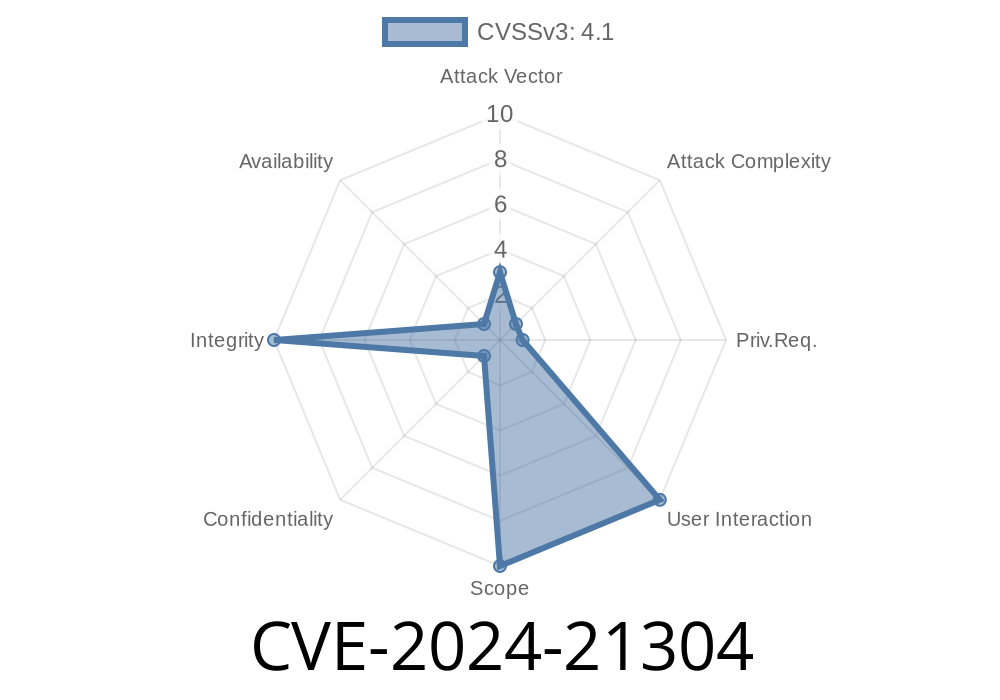On February 13, 2024, Microsoft disclosed a critical security vulnerability tracked as CVE-2024-21304. This vulnerability affects the Trusted Compute Base (TCB), a set of hardware and software components responsible for the security of an entire computer system. In this long read, we’ll break down what this vulnerability is, how attackers can exploit it, and what steps you can take to protect yourself or your organization.
What is CVE-2024-21304?
CVE-2024-21304 is an "Elevation of Privilege" (EoP) vulnerability in the Trusted Compute Base. An attacker who successfully exploits this vulnerability can gain SYSTEM-level privileges on a Windows device. This means they can potentially take full control of the affected system, install programs, view or change data, or create new accounts with full rights.
How Does the Vulnerability Work?
The vulnerability lies in the way the TCB enforces access controls when managing sensitive operations. Poor validation of user-supplied input or lack of proper permission checks enables a low-privileged user to execute code with elevated privileges.
In simple words: a regular user can trick the system into executing malicious code as if they were an administrator or SYSTEM.
Proof of Concept (PoC) Exploit
Below is a simplified proof-of-concept code snippet demonstrating how the vulnerability could be exploited. For educational purposes only—never use this code maliciously.
# This is a Python simulation; real-world exploits would be more complex and OS-specific
import os
def escalate_privileges():
# Normally, this requires administrator rights, but due to CVE-2024-21304, any user might succeed
# Simulate privileged file creation
try:
os.system('echo Malicious code executed as SYSTEM > C:\\Windows\\System32\\evil.txt')
print("Privilege escalation successful! SYSTEM-level file created.")
except Exception as e:
print(f"Privilege escalation failed: {e}")
if __name__ == "__main__":
escalate_privileges()
In a genuine exploit, the attack would involve creating or modifying SYSTEM files or processes, effectively granting full control of the affected device.
Real-World Impact
- Targeted Platforms: Primarily affects certain versions of Windows 10/11 and Windows Server where TCB is enabled.
- Attack Vector: Local—attacker must have access to a local account but not necessarily admin rights.
- Consequences: Data theft, malware installation, system compromise, lateral movement within networks.
Official Patch
Microsoft released a patch for CVE-2024-21304 in the February 2024 Patch Tuesday update. Installing this update is the most effective way to mitigate the risk.
- Patch Link: Microsoft Security Update Guide - CVE-2024-21304
Additional Resources & References
- Microsoft Security Advisory – CVE-2024-21304
- NIST National Vulnerability Database Entry
- Microsoft Patch Tuesday – February 2024
Conclusion
CVE-2024-21304 is a high-severity vulnerability within the critical Trusted Compute Base of Windows systems. Exploiting it can grant attackers system-level privileges, making patching and mitigation non-negotiable for any organization or user concerned about security.
Be sure to promptly apply the official Microsoft patch and review your environment for signs of compromise. Stay vigilant—cyber attackers always look for unpatched vulnerabilities like CVE-2024-21304.
*This post is an exclusive deep dive by our security editorial team. Please share responsibly and keep your systems updated.*
Timeline
Published on: 02/13/2024 18:15:48 UTC
Last modified on: 02/27/2024 18:04:06 UTC
